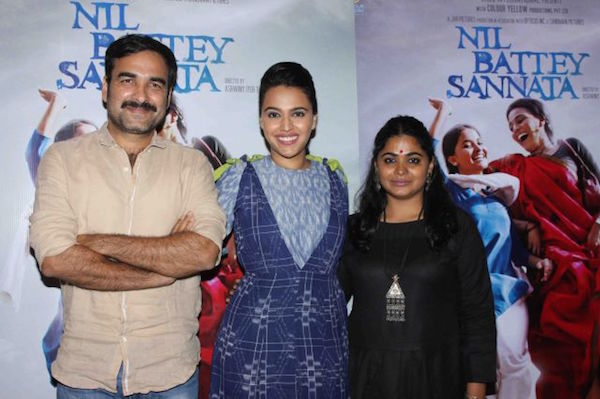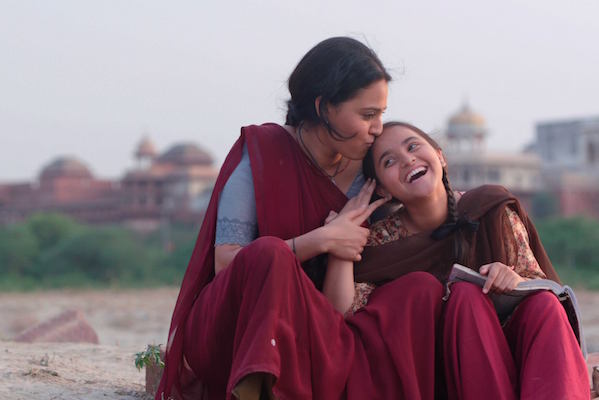Your past and present doesn’t determine your future – Ashwiny
Director Ashwiny Iyer Tiwari worked in advertising for a very long time before she quit her job to put her heart and soul into a film, which she believes has a very important message. Her film, Nil Battey Sannata, is a heartwarming tale of a mother and her child, whom she encourages to achieve more than she ever could. Here are some excerpts from an interview with the filmmaker, where she talks about the film’s inception and how people will be able to connect to this film on a personal level.

Ashwiny Iyer Tiwari
How did the genesis of Nil Battey Sannata happen?
I have been working in advertising for a long time. I was once doing a campaign for KBC called “Sirf gyan hi aapko aapka haq dilata hai.” We shot an ad regarding the girl child for this campaign, where in at the end a character says, “Mubarak ho! Ladki hui hai!” I thought to myself, that if a forty second ad could make such an impact, then a two-hour feature length movie could do wonders if presented properly on the big screen. I didn’t work on it immediately. My husband, Nitesh (Tiwari) who is also a filmmaker, came up with with this one line idea, which was beautiful. And we began to pursue it. We wrote the script and screenplay for over a year. Meanwhile, I directed a short film called What’s For Breakfast? which won an award. After we had finished writing the screenplay, we thought about taking it to Ajay Rai, who was an executive producer in my husband’s films, and our only one-point contact in Bollywood. Ajay loved the script, and insisted that I should make it into a film, rather than giving it to someone else. He said that nobody could understand the script better than myself.
READ: NIL BATTEY SANNATA | OFFICIAL TRAILER
Tell us the story behind the title Nil Battey Sannata.
It means a good for nothing person. Somebody can be a nil battey sannata at impressing girls or at dancing. A total hopeless case.
If you make your characters too serious, then everybody gets bored easily and cannot relate to them
The title also relates to Maths, which is a problem area for many.
We had to have something which catches attention and is funny at the same time. We had to give the message and tell the story in a very entertaining manner, so that it doesn’t look preachy. Otherwise people would think that it is just a waste of their money. Maths is something that is hated by almost everyone. Ten in twelve people will hate maths. That became interesting to use, and catch our audience’s attention.
You’ve shown a unique mother-daughter relationship. What type of characterization did you think of? Are they inspired by any real references?
I wanted to make characters which are very lovable and you want to hate them too when something particular happens, especially the daughter, who is gutsy and upfront. If you make your characters too serious, then everybody gets bored easily and cannot relate to them. My characters are quirky and have their own dialogues. It is easy to relate to them. My mother once called me and scolded me for being angry with her. In my defense, I told her that she was the only person that I could put my anger on. I couldn’t go scream at a dog. She got my point. [Laughs] We’ve all had such moments with our parents. I wanted to bring that unique mother-daughter relationship onscreen.

With Pankaj Tripathi and Swara Bhaskar
So was Swara Bhaskar your first choice to play the mother?
Yes! She was my first and only choice for two reasons. First, she is a thorough professional and second, she can speak the language. She’ll go out of her way to learn the language, do her homework and study the character. She will even surprise the director sometimes. That’s what she gets on board.
READ: MY IDENTITY AS AN ACTOR HASN’T BEEN BUILT ON LEAD ROLES – SWARA BHASKAR
How was the experience of working with her?
Swara and I have a love-hate relationship. We are best friends, but we can also cat fight with each other. She is an amazing person. I would love to do another film with her. If I think that I have a story that she will be able explore with her performance, then she is just a phone call away.
If I try to bring about a change with a very serious and dark movie, then it won’t work
What was the type of research that went into the making of the film?
I did a lot of research in terms of locations and characters. I wanted to shoot in Agra because that is the epitome of love between a man and woman, but also doesn’t mean that love between a parent and child is any less. And I wanted the place where I am shooting to face the dream of love. In terms of characterization, I went around and spoke to school and college girls in Agra. The dialect in Uttar Pradesh is different than what we hear in Mumbai. But emotions and sentiments are universal.
What is your core objective with a film like Nil Battey Sannata?
I am trying to bring about a change while also entertaining the masses. If I try to bring about a change with a very serious and dark movie, then it won’t work. People feel worse about themselves when something serious is being talked about in a depressing way. So, when the movie is funny and entertaining, audiences will get entertained and at the same time, have something to take back home too. I am not demeaning anybody or saying something harsh. The conversations are very quirky, that’s all.

Still from Nil Battey Sannata
The movie did really well at film festivals across the world. How do you think will it fare in India?
I have made the film specially for India. It usually happens that artsy movies win big at film festivals. We were fortunate that Nil Battey Sannata, a masala film, got rave reviews there. We haven’t spoken about the festivals and awards for this movie very aggressively. For India, this movie should be a clean state, which is ready to inspire millions!
READ: NIL BATTEY SANNATA WINS APPLAUSE AT BFI LONDON FILM FESTIVAL 2015
Do you think that the audience in our country is evolved enough to understand and empathize with something like Nil Battey Sannata?
We, as storytellers, are in a very a good time in the country. Our audiences have been evolved to understand and appreciate different kinds of cinema. Audiences across the language barriers, have become more accepting of the kind of stories they see in films, and have been evolving with them. They are not accepting bad stories. This is a story that they will accept. It is not something that only women or only men will like. Nobody is going to think of this as a women’s film. People are going to connect to this movie on a personal level, with respect to their own parents or children. There is nothing in this film that the audience can disassociate with.
Nobody is going to think of this as a women’s film. People are going to connect to this movie on a personal level
Is there any difference between the Tamil and Hindi version of the film?
Only that the people, the setting and the milieu is different. The script and the essence are the same. The colors are brighter in the Tamil version.
READ: NIL BATTEY SANNATA TO HAVE BOTH ITS HINDI AND TAMIL VERSION
What are your plans after Nil Battey Sannata?
I have already finished working on the Tamil version of Nil Battey Sannata. There is something happening after that too and the studio will announce it soon.
Finally, one message that you’d like to give your audience for this film.
That your past and present doesn’t determine your future. You have the right to dream, whatever your age, wherever you are.
-Transcription by Shikhar Goyal


